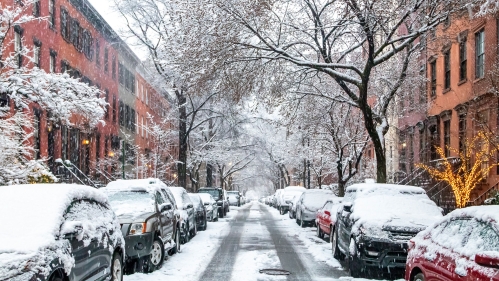How Weather Affects Crime Rates

Rutgers–Camden researcher finds link between volatile temperatures and violence
Climate change has made weather increasingly unstable, with extreme weather events becoming increasingly common. One Rutgers–Camden professor’s new research reveals a surprising consequence of the sudden, pronounced temperature changes associated with global warming: more violent crime.

Christopher Thomas, an assistant professor of criminal justice at Rutgers University–Camden, co-authored “Weird Winter Weather in the Anthropocene: How Volatile Temperatures Shape Violent Crime," recently published in the Journal of Criminal Justice. The article examines the effect of climate change on crime, investigating how unseasonable temperature swings correlate with homicide, assault, and robbery.
“Early research established a strong association between warm weather and violent crime,” said Thomas. “Studies over the years have further explored and supported this relationship, showing that violence typically peaks in the summer.”
Thomas and his co-author were interested in digging deeper to understand the impact of volatile weather on criminal behavior. They focused on the potential effects of temperature variability, exploring associations between extreme day-to-day temperature swings and the incidence of violence.
“We wanted to go beyond the existing body of research to understand the social consequences of sudden unseasonable temperature changes, both upwards and downwards,” said Thomas.
The study hypothesized that sudden anomalies in temperature would significantly disrupt regular, day-to-day human activities, leading to a change in violent crime rates. The authors based their hypothesis in the “routine activities theory,” which suggests crime occurs when three elements converge: motivated offenders, suitable targets, and the absence of capable guardians.
Warmer temperatures factor into the availability of suitable targets, who are more likely to engage in activities outside the home and cross paths with motivated offenders. With climate change creating more warm days, the researchers expected to see an increase in violent crime.
The study analyzed weather and crime data from 28 U.S. cities from 2015 to 2021. It examined incidents of homicide, robbery, and aggravated assault over a 30-day period, taking unusual temperature changes—both upward and downward—into account. A full review of the data confirmed the original hypothesis.
“Analysis revealed that temperature volatility is significantly associated with the incidence of violence, with unexpectedly warmer days linked to increases in robbery and homicide, and cooler temperatures showing the opposite trend,” Thomas said. “These associations were particularly strong in winter, aligning with routine activities theory.
“The primary aspiration for this study and other research I have been doing in this area is to inform targeted crime prevention strategies. But perhaps more importantly, I hope this research deepens our understanding of the social implications of climate change and the need to recognize and respond to the broader, systemic challenges it poses.”